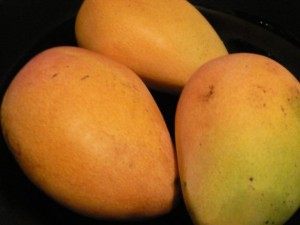 The mango fruit is one of the most popular and nutritious fruits known. In some countries, the mango is popularly termed as “king of all fruits” because of its superior taste, fragrance and nutritional content. Mangoes are tropical fruits and are believed to have originated in an Indian subcontinent. This fruit belongs to the Anacardiaceae family, along with nuts like pistachio and cashew. The scientific name of a mango is Mangifera indica.
The mango fruit is one of the most popular and nutritious fruits known. In some countries, the mango is popularly termed as “king of all fruits” because of its superior taste, fragrance and nutritional content. Mangoes are tropical fruits and are believed to have originated in an Indian subcontinent. This fruit belongs to the Anacardiaceae family, along with nuts like pistachio and cashew. The scientific name of a mango is Mangifera indica.
Nutrition Value of Mangoes
According to USDA’s database of nutrients, 100 grams of fresh mango usually contains:
Major Nutrients
Energy – 70 kcal; Protein – 0.5 grams; Carbohydrates – 17 grams; Total fat – 0.27 grams; Dietary fiber – 1.8 grams
Vitamins
Folates – 14 micrograms; Pantothenic acid – 0.160 milligrams; Riboflavin – 0.057 milligrams; vitamin C – 27.7 milligrams; vitamin E – 1.12 milligrams; vitamin K – 4.2 micrograms; Niacin – 0.584 milligrams; vitamin B6 – 0.124 milligrams; Thiamin – 0.058 milligrams; vitamin A – 765 IU
Electrolytes
Potassium – 156 milligrams; sodium – 2 milligrams
Minerals
Calcium – 10 milligrams; iron – 0.13 milligram; Manganese – 0.027 milligram; copper – 0.110 milligram; magnesium – 9 milligram
Phyto-nutrients
Alpha-carotene – 17 micrograms; beta-carotene – 445 micrograms; beta-cryptoxanthin – 11 micrograms
Health Benefits of Mangoes
Mangoes are a rich source of prebiotic fiber, minerals, vitamins and flavonoid antioxidants that fight against free radicals and prevent cell damage. According to research, mangoes have been found to help protect the body from certain cancers (colon cancer, leukemia, prostate and breast cancer). The polyphenolic antioxidants that are present in mangoes are said to be responsible for this function.
Mangoes can help maintain healthy vision because of its rich vitamin A content, as well as its beta-cryptoxanthin, alpha and beta-carotene content. These compounds are also known to help maintain healthy skin and mucous membranes. Also, consuming sufficient amounts of carotene-rich foods can help protect the body from lung cancer.
The potassium in mangoes helps regulate blood pressure and heart rate. Potassium is also an important part of body, as well as cell, fluids. Even mango peels bring benefits to the body, as these peels contain the phytonutrients polyphenols and carotenoids.
Potential Health Risks Caused by Mangoes
In some people, eating unripe and raw mangoes triggers an allergy. Symptoms of this allergy include itchiness of the lips, mouth and the tongue tip. Severe reactions include lip swelling, respiratory problems, diarrhea and vomiting.
The chemical compound responsible for this allergic reaction is anacardic acid, which is found in unripe and raw mangoes. Thus, people who have known allergies with mangoes should avoid eating this fruit in order to avoid an allergy attack.


Mango fruit as well as mango leaves are very good for skin these can add freshness to skin and can mask aging signs via antioxidants present in mango fruit. This makes mango really very good for health and beauty,